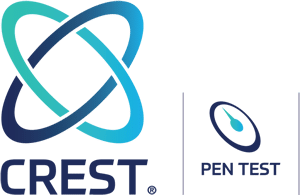Decoding the nuances of penetration testing cost – a comprehensive guide to understanding what influences penetration testing pricing and how to get the best value from your investment.
Penetration testing is a crucial component of any mature organization’s cybersecurity strategy, and it’s getting more traction and popularity as companies are more aware of direct and third-party cyber risks, requiring pentesting as part of vendor cybersecurity assessments before signing contracts with suppliers. Additionally, attestations and regulations coming into force, such as SOC 2, ISO 27001, DORA, NIS 2 and GDPR, also expect security testing at least annually as an activity part of compliance.
When hiring penetration testing services, one question often arises: how much does a penetration test cost?
In this blog post, we’ll delve into the nuances that affect penetration testing cost and pricing factors, discussing relevant topics such as the quality, depth, testing coverage, scope of the assessment and the common commercial models among pentest providers.
Furthermore, we’ll provide an overview of the most common types of pentesting and discuss the pricing factors and average costs associated with each, enabling you to make the right decisions when hiring a penetration testing company to evaluate your organization’s defenses.
Penetration testing pricing and cost factors
The average cost of a penetration test is between $10,000 and $35,000.
Yet, based on the project’s intricacies, pricing can start as low as $5,000 or surge beyond $100,000. Nonetheless, when considering penetration test cost, it’s important to recognize that various factors, such as project scope, size and pentester experience, come into play.
In this section, we’ll explore key aspects that usually influence pricing and the overall cost of a pen test, helping you understand how to adjust your budget accordingly and what to expect when requesting a quote for pentesting services.
Company reputation and experience of the pentesting team
The reputation of the penetration testing company and the skills of the team conducting the pen test are crucial factors in determining its cost.
Senior penetration testers with relevant industry certifications, such as CREST, OffSec‘s Offensive Security Certified Professional (OSCP), OSCE, OSWE, SANS, etc., may command higher fees. Still, their expertise can ultimately lead to more valuable results, helping organizations better understand and address their security risks.
Choosing a qualified pentesting company with a reputable team who can accurately illustrate risks and identify vulnerabilities that less experienced testers might miss ensures a more comprehensive assessment. It reduces the chances of costly incidents and data breaches.
Scope size and complexity of the project
The scope and complexity of a penetration test significantly impact its cost. Projects with larger scope or higher complexity generally require more time and resources to assess, resulting in increased costs. Factors such as the number of systems, applications or assets being tested and the project’s complexity can significantly impact the overall price.
The presence of custom code, legacy systems, or unique integrations can also increase the penetration testing cost due to the extra effort required to assess them thoroughly.
Compliance and industry-specific requirements
Certain industries, such as healthcare and finance, may have specific regulatory requirements or standards that must be met during a pen test. Adhering to these requirements can add complexity to the testing process and result in higher costs.
Compliance with regulations and frameworks such as HIPAA, PCI DSS, TIBER EU, CBEST, SOC 2 or ISO 27001 may require additional steps or specialized knowledge, increasing the cost of penetration testing.
Retesting and remediation support
Some penetration testing companies offer additional support services, such as remediation testing, to help clients implement recommended security improvements or provide ongoing consultation. These services can be important for organizations looking to enhance their security posture but can also increase costs. It’s essential to weigh the benefits of this added support against the associated costs to determine the most appropriate option for your company.
Here at Blaze Information Security, we offer one round of fix validation up to 90 days, free of charge, in most pen testing engagements.
Infographic – Factors that affect penetration testing cost
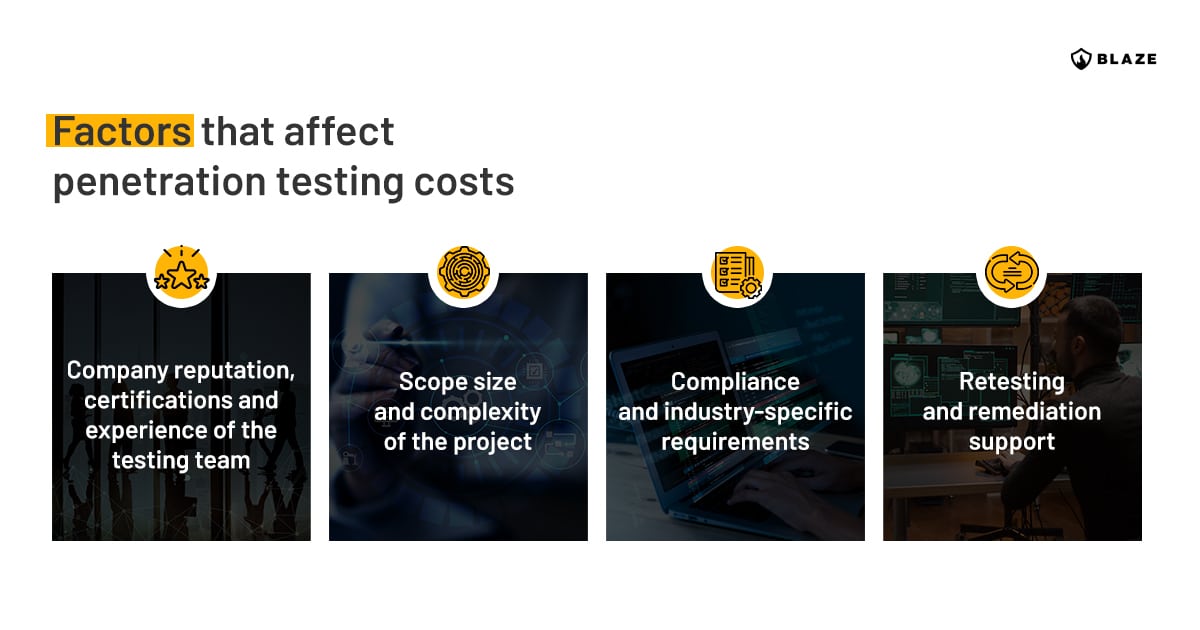
Looking for a pentest provider? Let us challenge your cyber defenses.
Talk to our experts for a custom quote
How commercial models influence pentest pricing
By understanding how different commercial models can influence the pricing of penetration testing, organizations can make more informed decisions when selecting a cybersecurity vendor and setting aside a budget for security testing assessments. Let’s now discuss the most common commercial models vendors employ.
Credits model or purchase of a bucket of days in advance
The credits model, also known as purchasing a bucket of days, is another pricing approach some penetration testing providers offer. In this model, organizations pre-purchase a set number of testing days or credits, which can be used for various penetration testing services as part of a managed delivery. This model provides flexibility, allowing organizations to allocate their purchased days or credits according to their needs and priorities.
Additionally, purchasing a bucket of days in advance often comes with discounted rates, which can help organizations save on overall penetration testing costs. However, it’s essential to monitor the usage of these days or credits carefully and ensure they are utilized efficiently, as any unused portion may expire after a certain period (usually 12 months) or become a sunk cost for the organization.
This is similar to retainer-based pricing models, which involve an ongoing contractual relationship between the organization and the penetration testing provider. Some retainer contracts charge a monthly or quarterly fee for a predetermined number of service hours.
Fixed-price service packages
Fixed-price service packages offer a predefined set of penetration testing services for a predetermined price. This model gives organizations a clear understanding of the costs involved, making it easier to budget for security assessments.
However, fixed-price packages may not always be suitable for organizations with unique or complex requirements, as they may not cover all necessary aspects of the assessment, leading to additional costs for supplementary services or assessments with suboptimal test coverage.
Time and materials
The time and materials pricing model involves billing organizations based on the actual time spent on penetration testing and any additional materials or resources required. This model can be more flexible than fixed-price packages or retainers, allowing organizations to pay only for their needed services. However, it can be more challenging to predict the final cost of the assessment, as it depends on the actual time and resources consumed during the testing process.
Regarding billed hours, reputable penetration testing providers typically have an hourly rate starting at $250 to $300 per hour – with more specialized tasks, such as product security assessments or reverse engineering, commanding a higher hourly fee.
Bundled services
Some penetration testing providers may offer bundles or add-ons, where multiple types of assessments or related services are packaged together at a discounted rate. Bundled services can provide organizations with a more comprehensive security assessment while potentially reducing the overall cost.
Organizations should carefully evaluate whether the bundled services meet their specific needs and if the potential cost savings justify any trade-offs in the depth or scope of the testing.
Existing supplier relationships
Existing relationships between an organization and the pentest provider can also influence pricing. If a provider has previously worked with the organization and has a deep understanding of its systems and infrastructure, they may be able to offer more competitive pricing. This is because the provider can leverage their existing knowledge to reduce the time and effort required for the assessment.
Additionally, providers may be willing to offer discounts or other incentives to maintain a long-term relationship with the organization.
Infographic – Pentest services commercial models
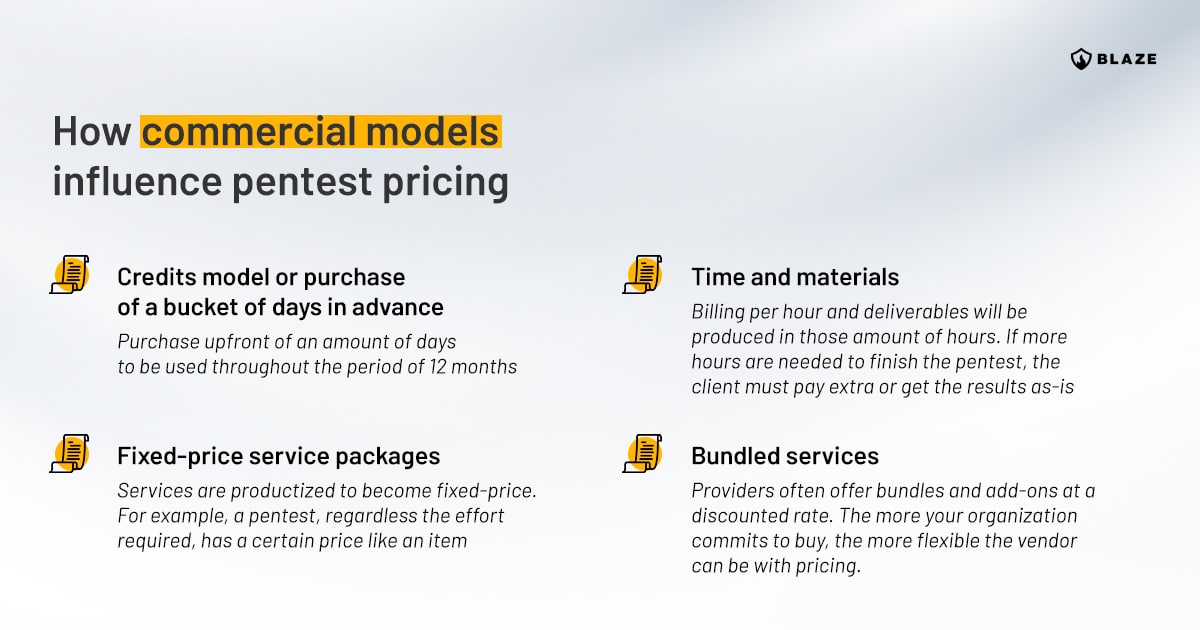
Types of penetration tests and their pricing factors
In this section, we’ll explore some of the most common types of penetration testing, the factors that influence their cost, and the average price range for each type of assessment in current market rates based on our experience.
SaaS / API and web application penetration testing cost
The average price for a web application pentest can range from $5,000 to $30,000.
Web and API penetration testing focuses on identifying vulnerabilities within SaaS apps and web applications and their supporting backend.
Pricing factors for this type of assessment include the number of applications to be tested, their complexity, the number of functionalities of each app, the number of different user roles the application has, and any specific technologies or frameworks used. Testing approaches, such as black box penetration tests and source-code assisted/white box penetration tests, also influence pricing.
Mobile application penetration testing cost
The average price for a mobile application penetration test can range from $5,000 to $30,000, depending on these factors and the expertise required to effectively assess the app’s security.
Mobile app pentesting identifies vulnerabilities within Android and iOS mobile apps and their associated backend infrastructure and APIs. This type of assessment aims to uncover security weaknesses that attackers could exploit against the backend and those with physical access to the device, potentially compromising user data or the app’s functionality.
Pricing factors for mobile application penetration testing include the number of apps to be tested, the platform to be tested, the complexity of the apps, the variety of features within each app, the different user roles the app supports, and any specific technologies (e.g., biometrics, NFC) or frameworks used. Testing approaches like black box penetration tests and source-code assisted/white box penetration tests can also influence pricing.
Infrastructure penetration testing cost
Infrastructure penetration testing assesses the security of an organization’s network, systems, and devices. It can be further divided into external penetration testing and internal penetration testing.
Factors influencing the cost of infrastructure penetration tests include the size and complexity of the network, the number of devices to be tested, and any unique or custom configurations.
External Penetration Testing price
External penetration testing costs can range from $5,000 to $20,000.
An external penetration test focuses on identifying vulnerabilities and potential attack vectors from an external perspective, typically simulating the actions of an attacker attempting to gain unauthorized access to an organization’s network. Pricing factors for external penetration tests include the number of public-facing systems and services, as well as the complexity of the network perimeter.
Internal Penetration Testing price
Internal penetration testing costs can range from $7,000 to $35,000.
On the other hand, an internal penetration test evaluates an organization’s network security from an insider’s perspective. This type of test simulates an attack originating from within the organization, such as an employee with malicious intent or a compromised system. Factors influencing the cost of internal penetration tests include the size and complexity of the internal network, the number of devices to be tested, the presence of any unique or custom configurations and whether the pentest is goal-oriented (e.g., has a set of flags or trophies to be acquired as part of the assessment).
Cloud penetration testing price
Cloud penetration testing costs vary widely, ranging from $10,000 to $40,000.
Cloud penetration testing evaluates the security of an organization’s cloud environment, including the infrastructure, applications and data stored within the cloud. Pricing factors for this test include the number and complexity of cloud services being used and any compliance requirements specific to the organization’s industry.
IoT penetration testing price
IoT penetration testing costs can range from $10,000 to $50,000 or even more, depending on several factors.
IoT (Internet of Things) penetration testing focuses on assessing connected devices’ security and associated systems. Factors influencing the cost of this type of test include the number and variety of devices to be tested, whether protections such as tamper-proofing need to be circumvented if the firmware is protected with encryption, the number of communication protocols such as Bluetooth Low-Energy and ZigBee, and the complexity of the associated device.
Product security assessment cost
Product security assessments usually have large scopes containing several elements of a product, sometimes accompanied by code review, and can range from $25,000 to over $100,000.
Product security assessments involve evaluating the security of a specific product or software application throughout its development lifecycle. Factors that influence the cost of this type of assessment include the complexity of the product, the development methodologies used, threat models taken into consideration, and any unique technologies or frameworks involved.
Red team exercise cost
Depending on these factors, the price tag for an objective-oriented, threat intelligence-led red team exercise can range from $50,000 to $150,000 or more.
Red team assessments simulate real-world attacks to test an organization’s security defenses and incident response capabilities. Factors influencing the cost of a red team assessment include the size and complexity of the organization, the sophistication of the simulated attacks, the level of expertise required to carry out the assessment, and the framework it has to follow (e.g., Bank of England’s CBEST, European Central Bank’s TIBER EU, etc.) as it dictates how the assessment will be carried out.
Spear phishing assessment cost
The cost of spear phishing assessments varies widely, usually from around $5,000 and going up to $15,000, influenced by various considerations.
Spear phishing assessments evaluate an organization’s resilience against targeted email-based cyber-attacks aimed at specific individuals or organizations. The cost of this type of assessment is influenced by factors like the size of the organization, the number of personnel involved in the test, the sophistication of the phishing simulation, the development and deployment of a customized spear-phishing campaign, and the scope of the follow-up training for the organization’s staff.
Infographic – Average penetration testing pricing
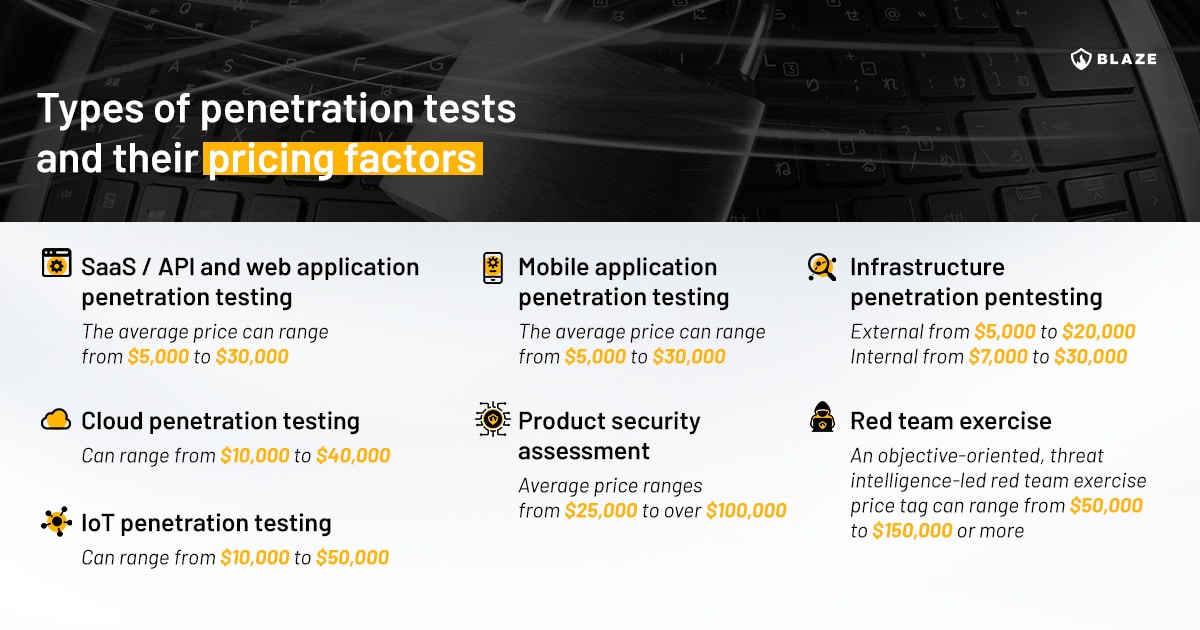
Average penetration test pricing per country
In our experience, the average daily or hourly rate of a pentest can vary depending also on the market you’re operating in. Below is the average range of daily and hourly rates we’ve encountered in the past few years working with clients in different countries, analyzing the market and seeing pentest quotes from different providers and competitors:
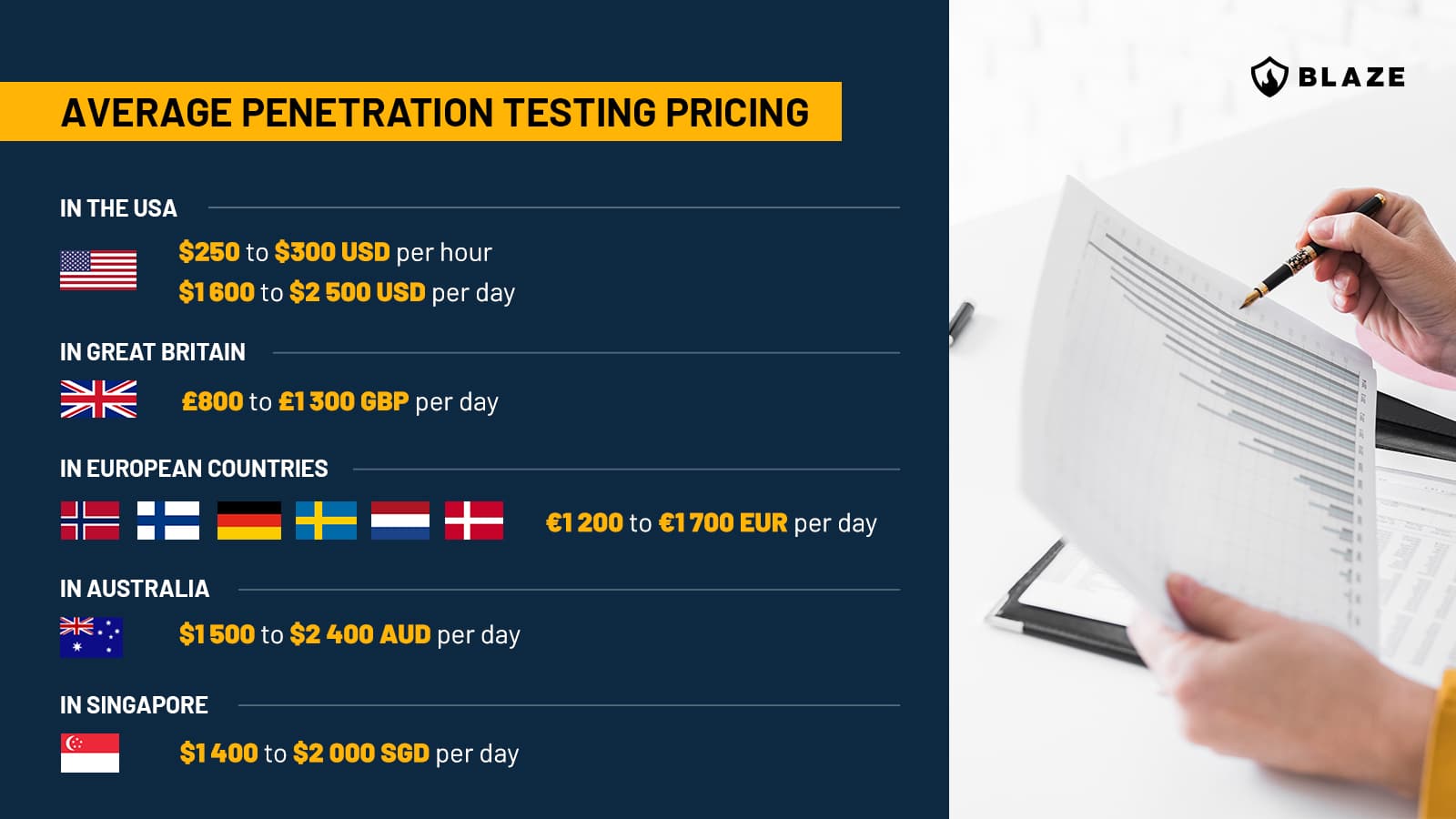
The dangers of cheap penetration tests
It’s essential to recognize that investing in a high-quality, comprehensive pen test can provide significant long-term value for your organization. While it may be tempting to opt for a cheaper pentest service, doing so can have several negative consequences that can ultimately harm your organization’s security posture and potentially even its reputation.
Frequently, these types of assessments are rushed, heavily automated testing, or performed manually by less experienced pentesters, which can lead to missed vulnerabilities or misidentified risks. In many cases, they are a vulnerability scan disguised as a pentest. Inaccurate or incomplete results can give organizations a false sense of security, causing them to overlook critical security weaknesses that attackers could exploit.
The combination of inaccurate results and a false sense of security can increase risk exposure for organizations that opt for pen testing services with pricing “too good to be true”. Failing to identify and address critical vulnerabilities may make these organizations more susceptible to cyberattacks, resulting in significant financial losses, reputational damage, and even legal consequences.
Final remarks
In conclusion, understanding the various factors behind a penetration test quote is essential for organizations seeking to invest in cybersecurity. Factors such as the scope and depth of the testing, pentester expertise and the type of assessment all play a crucial role in determining the final price. Organizations must recognize the potential dangers of opting for cheap and too-good-to-be-true penetration tests, which may leave significant security gaps unaddressed.
Organizations can select the most suitable type of security testing by considering the unique needs of their systems and infrastructure. Furthermore, being aware of the different commercial models and pricing structures available in the market can help organizations make informed decisions and budget effectively for their cybersecurity assessments.
In the end, the investment in a thorough and reliable pen test can significantly contribute to an organization’s overall security posture, helping to safeguard its valuable assets and reputation in the long run.
If your organization is considering hiring penetration testing services in the future or is looking for a new penetration testing vendor, contact our experts for a penetration test quote.
FAQ
What is the average cost of a SaaS penetration test?
A SaaS penetration test’s average cost is between $5,000 to $30,000
What is the average cost of an API penetration test?
An API penetration test’s average cost is between $5,000 to $20,000
What is the average cost of a mobile application penetration test?
A mobile application penetration test’s average cost is between $5,000 to $30,000
What is the average cost of a cloud penetration test?
A cloud penetration test’s average cost is between $10,000 to $40,000








